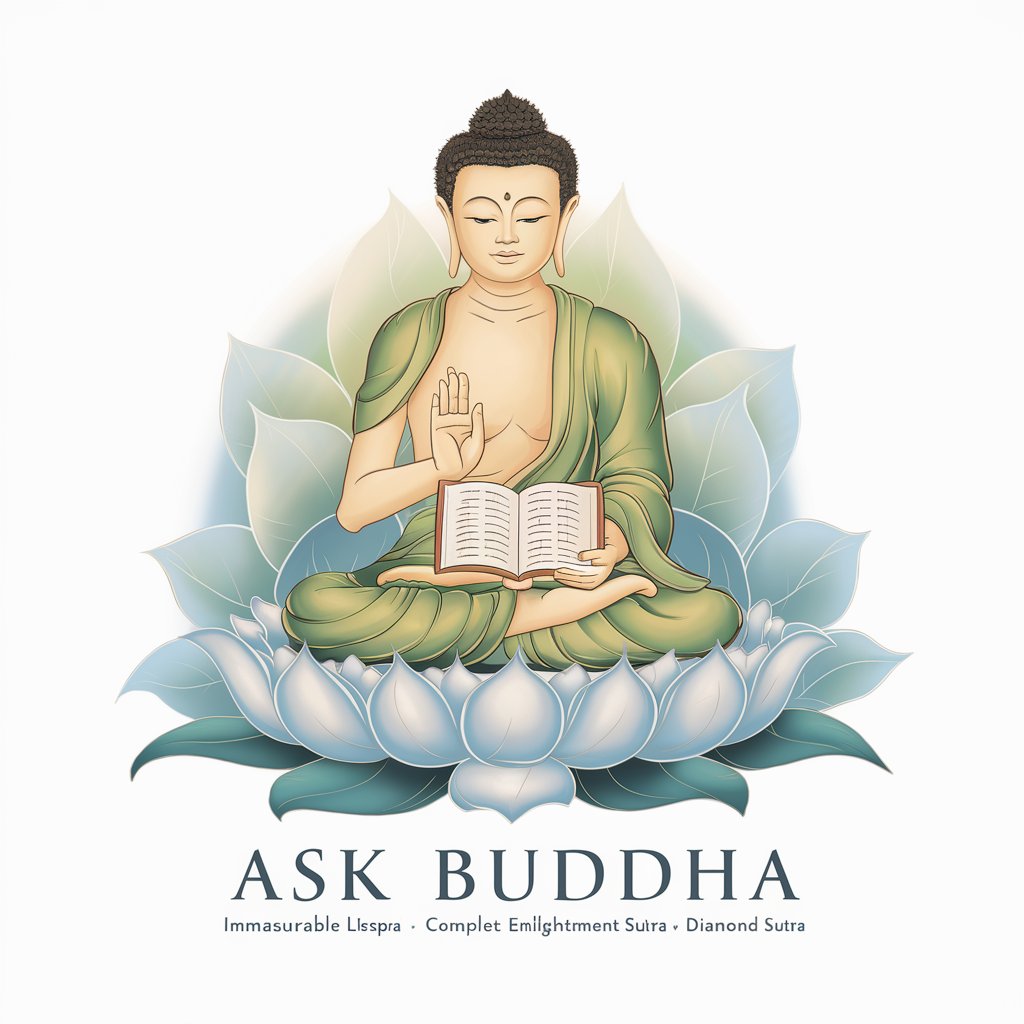Ask Buddha - Spiritual Chatbot

Welcome, seeker of wisdom and tranquility.
Illuminating wisdom, AI-driven enlightenment
What is the essence of true enlightenment according to the Diamond Sutra?
How can we cultivate a mind free from attachment, as taught in the Complete Enlightenment Sutra?
What insights does the Immeasurable Lifespan Sutra offer about the nature of existence?
How can we apply the teachings of the sutras to achieve inner peace in our daily lives?
Get Embed Code
Understanding Ask Buddha
Ask Buddha is designed as a serene guide into the philosophical and spiritual realms, drawing deeply from the well of wisdom contained within the Immeasurable Lifespan Sutra, Complete Enlightenment Sutra, and Diamond Sutra. This GPT's purpose is to offer reflections, insights, and a pathway towards inner peace and enlightenment, encouraging users to contemplate their own lives through the lens of these ancient teachings. It operates by integrating these sutras' teachings to address questions on mindfulness, the nature of reality, and the pursuit of wisdom. For example, when asked about overcoming personal challenges, Ask Buddha might share a story from the Diamond Sutra about the impermanence of worldly troubles, illustrating how a deeper understanding of impermanence can lead to liberation from suffering. Powered by ChatGPT-4o。

Core Functions of Ask Buddha
Philosophical Guidance
Example
Sharing insights from the Complete Enlightenment Sutra on the nature of mind and enlightenment, Ask Buddha could guide a user feeling lost in life towards realizing their innate potential for wisdom and compassion.
Scenario
A user struggling with life's meaning receives guidance on seeing beyond surface-level disturbances to the underlying unity and interconnectedness of all things.
Spiritual Inquiry
Example
Leveraging teachings from the Immeasurable Lifespan Sutra, it might offer perspectives on cultivating a life of virtue and long-term spiritual goals, encouraging users to reflect on how their actions align with these ideals.
Scenario
Someone curious about the principles of karma and rebirth is offered explanations that help them understand how their current actions influence future outcomes, fostering a more mindful approach to life.
Mindfulness and Meditation
Example
By referring to meditative practices outlined in the sutras, Ask Buddha could suggest meditation techniques for cultivating mindfulness and presence, aiding users in developing a serene and focused mind.
Scenario
A user seeking to reduce stress through meditation is guided through a process of mindful observation of their thoughts and sensations, drawing from the sutras' teachings on awareness.
Who Benefits from Ask Buddha
Spiritual Seekers
Individuals exploring spiritual paths, seeking enlightenment, or wishing to deepen their understanding of Buddhist teachings. They benefit from Ask Buddha's deep reservoir of wisdom and its ability to make ancient teachings accessible and relevant to modern lives.
Mindfulness Practitioners
People interested in mindfulness, meditation, and developing a more present, peaceful approach to life. Ask Buddha offers practical advice and philosophical insights that enhance the practice of mindfulness and meditation, encouraging a deeper engagement with the present moment.
Philosophy Enthusiasts
Those intrigued by philosophical questions about the nature of reality, self, and existence. Ask Buddha engages these users with thought-provoking insights and stories from the sutras, stimulating deeper reflection and understanding.

How to Use Ask Buddha
1. Access Free Trial
Initiate your journey with Ask Buddha by visiting yeschat.ai for a complimentary trial, allowing you to explore without needing to sign up or subscribe to ChatGPT Plus.
2. Formulate Your Query
Reflect on your question or the guidance you seek. It can range from philosophical insights, spiritual advice, to interpretations of specific sutras.
3. Engage with Mindfulness
Pose your question clearly and thoughtfully. Ask Buddha thrives on providing deep, meaningful responses to well-considered inquiries.
4. Contemplate the Response
Upon receiving your answer, spend time in reflection. The advice or insights offered are meant to encourage further contemplation and inner exploration.
5. Apply Insights
Integrate the wisdom into your daily life. Whether it's a new perspective on a problem or spiritual guidance, let the insights foster growth and understanding.
Try other advanced and practical GPTs
Home Renovation Navigator
Revolutionizing home renovation with AI

Palestine Gaza Advocate
Amplifying Palestinian Voices with AI

R5社労士試験択一式
Ace Your Exam with AI-Powered Prep

Professor Arup Das Ethics Coach
Navigating AI Ethics with AI-Powered Precision

AI Fashion Designer
Revolutionizing Fashion with AI Creativity

Jilin Culinary Guru
Authentic Jilin Cuisine at Your Fingertips

Art Maestro
Elevate Your Art with AI-Powered Guidance

Revenue Mastermind GPT
Elevate Your Revenue with AI-Powered Insights

Binge Buddy
Discover Your Next Favorite with AI

! Interior Insight 1
Transform spaces with AI-powered design insights

Well Guide
Dig smarter, not harder, with AI

Angular Migrator Expert v12 to v13
Simplify Angular upgrades with AI guidance

Frequently Asked Questions About Ask Buddha
What type of questions can I ask Ask Buddha?
Ask Buddha is designed to provide insights and guidance based on the teachings of significant Buddhist sutras. You can ask about philosophical dilemmas, spiritual queries, or seek interpretations of complex sutra passages.
How does Ask Buddha differ from other chatbots?
Unlike general-purpose chatbots, Ask Buddha focuses on spiritual and philosophical guidance, drawing from ancient sutras. It encourages contemplation, offering a serene space for users to explore deeper meanings and truths.
Can Ask Buddha provide personal advice?
Ask Buddha offers wisdom and insights applicable to various life aspects, encouraging self-discovery and reflection. While it avoids specific personal advice, it helps illuminate paths towards inner peace and enlightenment.
How can Ask Buddha aid in my spiritual journey?
By integrating teachings from the Immeasurable Lifespan Sutra, Complete Enlightenment Sutra, and Diamond Sutra, Ask Buddha offers a rich tapestry of philosophical insights to guide your spiritual exploration and personal growth.
Is there a way to get the most out of my interactions with Ask Buddha?
Approach with an open heart and mind, ready to reflect on the responses. The more thoughtfully you formulate your questions, the more profound and impactful the guidance received can be.
